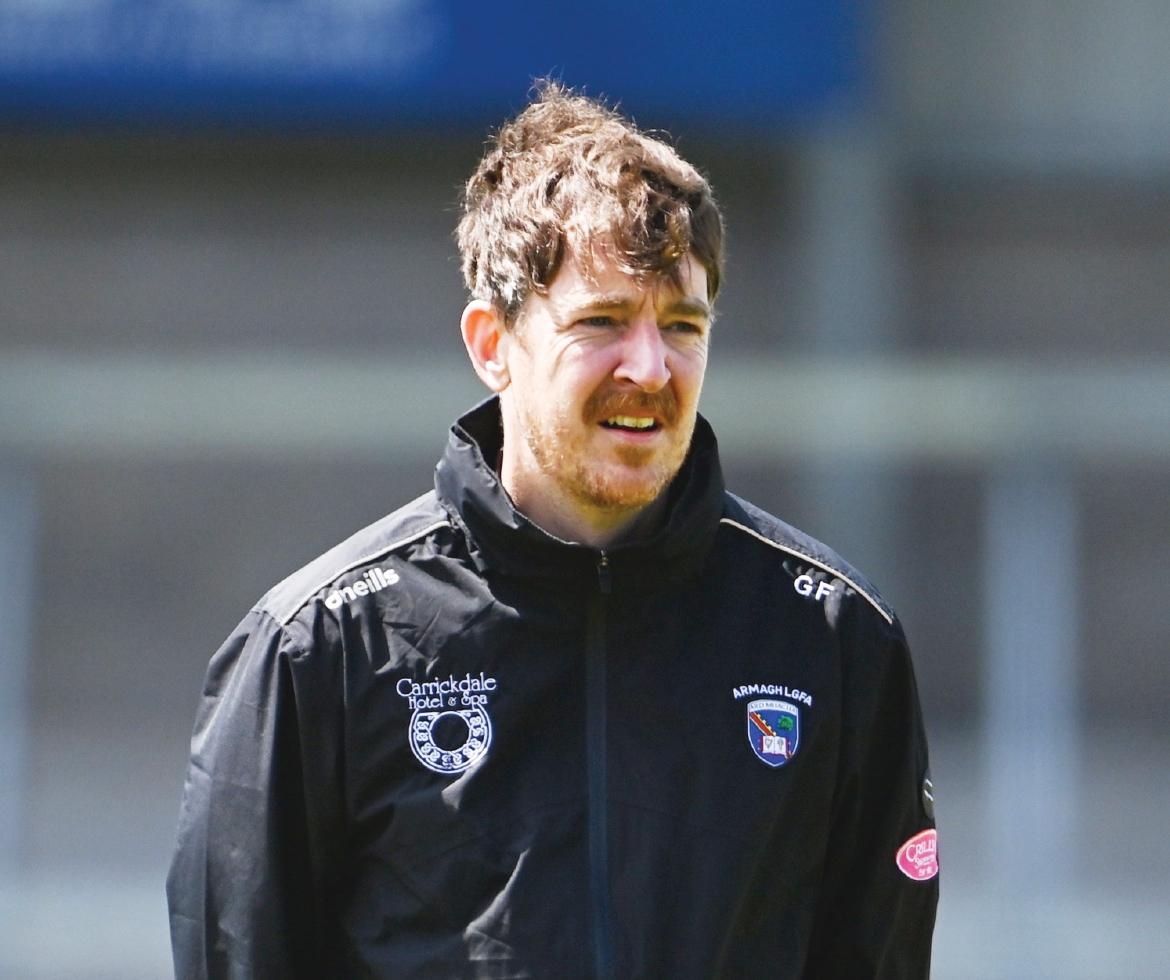Hand in hand with the coaching side of the game is the mental preparation. Mental skills coach Gareth Fox takes a look at some key aspects of the championship arena. Michael McMullan picked his brain…
A COMMON theme of the curtain coming down on Premier League football at Goodison Park was the fortress it became. The same is said about Ballybofey as Jim McGuinness and his squad host Tyrone on Saturday.
Derry go to the home of the All-Ireland champions. There was the Corrigan Park or nowhere debate. Cavan and Down came away with excellent results last weekend on the road.
We’ve heard pundits, players and managers say such and such a ground is “a tough place to go”, especially if the home team are underdogs.
Gareth Fox, a former Gaelic Life columnist, is a Mental Skills Coach. He worked with Glen and Cushendall on their recent journeys. This season, he is back with the ‘Dall and is also involved with Clann Éireann in Armagh.
“In terms of home advantage, it is certainly a thing,” he begins. “It provides one team with a set of advantageous circumstances that another lacks, but it isn’t a guarantee for a result.”
The key word is familiarity. Scratch the surface and it’s a familiarity in how a team can control their preparations. From players being able to sleep in their own beds to eating a breakfast of choice.
Another is the level of social interaction on matchday. Everyone is different.
“Some players find it exhausting having to be around their teammates for too long, whether that be on a bus or in a hotel,” Fox points out.
There is the amount of time spent sitting on the way to a game. Couped up in a bus or car.
As for the venue, it’s familiarity with the dressing room. Where a player sits. Even which toilets have a lock on the door that works.
“Then there is the familiarity of the pitch itself – knowing where you are at any given moment,” he adds.,
“Knowing where the posts are without having to forgo a split second to check. These things are miniscule in isolation but can carry a positive impact in combination.”
These are the factors a home team can see and feel but there is the “mythical psychological” side. The smoke and mirrors.
From this side, home advantage “absolutely is a thing” yet isn’t exactly a thing. A contradiction? Fox explains what makes it a thing.
“The key ingredient is proof, which only falls into the realms of something a player has influence over, not control over,” he outlines.
“The difference between something becoming a self-fulfilling prophecy and a self-defeating prophecy is whether that proof is positive or negative.”
If the home team lands the first major score or a momentum swing goes in their favour, all of a sudden, the home pitch can be deemed a fortress. If they don’t, then home advantage is merely words.
From a coaching point of view, why are messages rolled out about a home venue being an extra inch over opponents?
“What you are really doing here is telling a story in the hope you positively impact a player’s ‘arousal’ at the start of a game, their state of alertness and readiness to perform,” Fox explains.
Once the ball is thrown in, the world more of less goes out the window. A player’s headspace is engaged with their role, the next ball and where they fit in the overall plan.
“It’s telling a story to create a mood in a player that you hope fuels their performance, but that mood can suddenly change after the first play.
“It’s about belief and resources. If you think your pitch has a certain aura, then it’ll feel like another string in your bow and that’s one more reason for you to feel like you can win a game.”
Another aspect of playing at home is the crowd getting behind the team and being almost like a 16th player.
It depends on the situation. Supportive fans can definitely help with a players’ arousal before and during games. But there is another side.
Critical fans, with unreasonable expectation levels, won’t give their team any help. In fact, it can be the opposite.
“You only have to look at the home records of Man United and Liverpool in recent years,” Fox offers as context.
“It’s not uncommon for players to dislike playing at home because of the impact of fan criticism, unreasonable expectations, and how fans make them feel.
“In the same breadth, the right cocktail of fan energy and encouragement can bring the best out in players.”
So, that’s the angle on the home team. What of the visiting team? Again, playing a team who are difficult to beat at home is only words. It comes down to levels of intimidation and whether a team succumbs to it. Some do, others don’t. Fox digs deeper.
“The thing that really drives team performance is how those players feel both individually and collectively,” he said.
“If you allow yourself to believe a story then you give away the power over how you feel.”
The real factor is how much a home team can maximise the familiarity of playing at home offers as a help.
With Dublin being used to playing at Croke Park, much has been said about the Leinster GAA decision to move the semi-finals out of HQ this season.
We’ve often heard the phrase “silence the Hill” when taking on the Dubs in Croke Park and the fact most fans only sing when they are winning.
“Again, this is a story to impact the arousal of a player,” Fox said of any pre-game thoughts of keeping a home crowd silent.

HOME COMFORTS…Donegal are difficult to beat at Mac Cumhaill Park
“Unless a player actively goes out with that as their ‘swing thought’ for the whole game, as soon as the ball is thrown in, silencing the Hill as a thought goes way down the pecking order in terms of priority.”
It’s replaced by the need to win the next kick-out, hoover the next breaking ball or force the next turnover.
***
There has been a new phenomenon in the game since the FRC rolled out the new enhancements. Hooter time. The clock ticks towards the 70th minute, a hooter sounds.
There is clarity. The team in possession has their one remaining play to see out a game to notch an equaliser or a winner.
At games without the hooter, teams will process the stoppage time on the fourth official’s board. Four minutes. We still have time. Let’s use it.
Think of Louth starving Meath of the ball after Sam Mulroy put the Wee County on the way to a first Leinster title in 68 years.
The same for Donegal coughing up two possessions in the closing seconds of the Ulster final, with the second leading to Oisin Conaty’s equaliser.
We had the term composure rolled out. Successful teams never panic. But, what does that actually mean? Where does game management come from?
Fox gives his take. Repetition of the given situation is important. While it’s impossible to replicate the pressure of the championship’s white heat, it’s as close as it comes.
“Communication between players is perhaps the most important thing in terms of game management, communication and body language,” he outlines.
“There are certain neurons within the brain called mirror neurons. These make it so that you mirror the actions and emotions of the people you are closest to.”
If a player looks around and sees a teammate, a leader or someone along the sideline showing signs of stress or not dealing with the pressure, it will spread.
“You will begin to mirror that, as do the rest of your team and you’ll struggle to make clear controlled decisions with the ball,” Fox said of the negative side of the emotion.
If a player is in possession is surrounded by those in control, with a positive body language, that also spreads. In this scenario, comes the best chance to make the right decision.
“These things are your fundamental mental skills, that players practice week in week out at training and in games,” Fox continues.
The key factors are staying ‘clear in chaos’. Breathing techniques. Body language resets and ‘swing thoughts’ to allow them to feel exactly what they want to feel in any given moment of a game.
“Performance comes from “feeling”, so the best thing is to control what they feel, and their teammates in turn mirror this,” he sums up.
***
There is another aspect of sport. Who is going to win? Who is going to lose? For us in the media, we live and die by our predictions.
How often have we heard it? A winning player or manager is addressing the media after a victory. There have been a few moments to gather their thoughts. Their team have been underdogs.
“We’ve proved a lot of people wrong here today,” can be a common response.
There can be a statement that “everyone wrote us off” in the seconds after a win.
In many cases it’s true. In sport, there are favourites and there are underdogs.
What can be bizarre is how teams, before a game, hate to be tipped. They love to be talked down. Until they win. Then, it’s a case of nobody gave us a chance.
“Again, it’s just a story to promote a feeling of arousal that management hope will help players perform,” Fox said.
“I’d hazard a guess, that of a squad of 30, 30 per cent of players aren’t motivated by things like that. It might be more.”
Who why is a big deal? It’s not unknown for managers to trawl the media to find the one person who tips their team to lose.
And, hey presto, that’s what makes it to the dressing room wall. The other nine predictions for them to win don’t count.
“If you break down game preparation, it’s about sharpening basic skills, providing tactics, then adding energy. Then the referee throws the ball in,” Fox points out of the main body of pregame routines.
“The ‘everyone is writing us off’ is ‘adding energy’ and it definitely motivates some players, but does it really motivate everyone.
“I know through some of the players I work with that it doesn’t. Are players wrong to think ‘who cares’?
“Not at all, but managers, captains and leaders are throwing stuff at the wall and hoping some things stick. And that’s fine too.
“It’s only not fine when you try to force a player to care about something you care about when they don’t.”
There we go. An insight into the mental side of team preparation. There will be games every weekend. Favourites. Teams written off.
Unbeaten home records. An opponent coming to tear a house down. When the fat is in the dying embers of a fire, some players will panic and fail. Others will take a deep breath and trust the process.
Winning teams will be the ones who look after the top six inches in the same way they nurture the rest.
Receive quality journalism wherever you are, on any device. Keep up to date from the comfort of your own home with a digital subscription.
Any time | Any place | Anywhere













